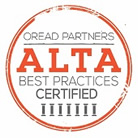Action to Quiet Title: An action to quiet title is a lawsuit to establish a plaintiff’s title to land by compelling the adverse claimant to either establish a claim or to be quiet about his/her challenges or claims to the title. An action to quiet title is generally brought in a court having jurisdiction over land disputes. It establishes a party’s title to real property against everyone.
Certified Copy (Death Certificate): Issued by the local Vital Records office will have a raised seal, will show the signature of the local registrar, and will be printed on security paper.
Cloud on Title: An apparent claim or encumbrance, such as a lien, that, if true, impairs the right of the owner to transfer his or her property free and clear of the interests of any other party.
Financing Statement: A legal form that a creditor files to give notice that it has or may have an interest in the personal property of a debtor.
Landlocked Parcel: A parcel of land surrounded entirely by private owned land, with no access to a public right of way (road).
Lis Pendens: A legal notice recorded to show pending litigation relating toreal property, and giving notice that anyone acquiring an interest in said property subsequent to the date of the notice may be bound by the outcome of the litigation.
Mechanic’s Lien: A lien created by statute for the purpose of securing priority of payment for the price or value of work performed and materials furnished in construction or repair of improvements to land, and which attaches to the land as well as the improvements.
Notice of Completion: Written notice issued by the owner of a project (or his or her agent) to notify concerned parties that all work on the project has been completed. This notice also sets the period within which concerned parties may exercise their lien rights against one another.
Power of Attorney: An authority by which one person (principal) enables another (attorney in fact) to act for him/her. (1) General Power – authorizes sale, mortgaging, etc. of all property of the principal. (2) Special Power – Specifies property, buyers, price and terms, etc.
Torrens System: Land registration system in which the government is the keeper of all land and title records, and a land title serves as a certificate of full, indefeasible, and valid ownership.





